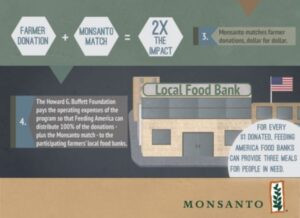The GMO Wars: Biotech Companies to Do ‘Whatever It Takes’ to Get Your Support

Reuters recently reported that a group of executives from biotech giants including Monsanto, Dow Chemical and DuPont, are creating a campaign targeted at changing public opinion about genetically modified organisms. “The big biotech firms are still working out details of their plan, but it will likely have a large social media component,” the article stated. “The group will focus on conveying what it says are the many benefits of biotech crops.”
Californians and non-GMO advocates across the country may remember last November’s vote when a highly publicized GMO labeling initiative (Prop 37) was narrowly defeated. Credit the shocking loss to the “No on 37” efforts funded by big-ag and biotech firms to the tune of some $40 million. Ads dismissed the GMO labeling bill as a “costly food labeling bill” that would put the onus on taxpayers and farmers—even though research showed that would not be the case.
What was most disturbing about the No on 37 tactics, however, was that the companies behind the campaign chose to be less than honest with Californians (they used a similar tactic victoriously in Oregon nearly a decade earlier). The ads didn’t mention GMOs directly. Instead, they focused just on how much it would cost, and why it was a silly move in the first place. In other words, they lied. And it worked.
Even though those efforts eked out a surprising win in California, concern has only heightened over the risks connected with GMOs. California Sen. Barbara Boxer and Oregon Rep. Peter DeFazio just introduced a bill to Congress that would require GMO labeling across the country. Countless organizations are singling out biotech companies and foods that contain GMOs. A global “March Against Monsanto” is scheduled for “everywhere” on May 25th. And perhaps the most notable repercussion of Prop 37’s failure was the news released in March that Whole Foods Market—the nation’s largest organic and natural focused supermarket chain—announced that by 2018, all products sold in their stores will have to disclose on the product label if it contains GMOs. This goes for shampoo, vitamin C, and a steak, if the cow ate GMO grains, as well as common food items.
Think you’re too smart to be duped by Monsanto and the campaign’s efforts at turning public perception? You just may be. But, cleverness and wit are as vital to the biotech industry as chemicals and patents.
It’s hard to acknowledge that deception is a core principal of business, but there it is, news story after news story. Wall Street execs do it (the IRS just did it too), banks, athletes, churches…it seems no segment of our culture is immune to deceptive practices for profit. Still, many of us believe wholeheartedly that corporations are too big to hurt us. (The pharmaceutical industry is the most heavily fined industry in the U.S.–mostly for deceptive marketing of products not tested for ailments they claim to treat.)
Biotech companies are notorious for telling farmers they’ll increase yield, see fewer pests, and, most notably, make more money if they switch to GMO seeds. But they don’t tell them about herbicide and pesticide resistant bugs and weeds. Or yield drag. Or the toxins they’ll be exposed to with the excessive herbicide and pesticide applications. Perhaps the most disturbing example of poor representation of biotech crops happened in India (and still occurs), where Monsanto sold millions of farmers GMO cotton seeds and herbicides. The cotton performed much more poorly than the companies promised, leaving farmers in debt, which led to hundreds of thousands of suicides—most of the farmers reportedly drank the very herbicide they couldn’t pay for.
It’s not just that public opinion over GMOs is changing. Public opinion over food in general is changing. That doesn’t mean we’ll stop eating processed foods anytime soon, but it does mean more and more people are paying closer attention, even if we’re no good at telling when we’re being lied to.
Monsanto vice president Jerry Steiner told Reuters, “there is a fact gap that exists. It is our responsibility to do a better job of filling it.” And fill it they no doubt will. We can expect a lot more lies in the not-too-distant future. Subtle tweaks to packaging. Wordplay. Creative images. Tear-jerking commercials that make us think about farmers, American Pride, fedding the world’s hungry, and what the word “wholesome” really even means. (See the top image for Monsanto’s Invest An Acre program to fight rural hunger.)
As we, the consumers, empower ourselves, we can often become more gullible to suggestion. Biotech corporations and the companies who use GMO ingredients are masters at creating ads that tell us exactly what we want to hear. They’ve got too much to lose if you walk out of a supermarket with just a shopping cart full of fresh fruits and vegetables.
So while non-GMO campaigns and education efforts are making it easier to understand which products contain GMO ingredients and what the risks are, GMO companies plan to use to the same tactics to confuse and convince us otherwise. Batten down the hatches, folks. The war is on.
Keep in touch with Jill on Twitter @jillettinger
Image: Monsanto

